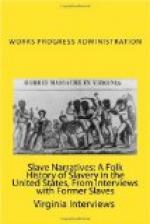Mr. Lane’s family was comprised of his wife, Fannie (who also was very kind to the slaves) five children, Harriett Ann, Jennie, Jeff, Frankie and Mae Roxie, a brother (whose name he does not recall) who owned a few slaves but was kind to those that he did own. Although very young during slavery, “Parson” remembers many plantation activities and customs, among which are the following: That the master’s children and those of the slaves on the plantation played together; the farm crops consisted of corn, cotton, peas, wheat and oats; that the food for the slaves was cooked in pots which were hung over a fire; that the iron ovens used by the slaves had tops for baking; how during the Civil War, wheat, corn and dried potatoes were parched and used as substitutes for coffee; that his mother was given a peck of flour every two weeks; that a mixture of salt and sand was dug from the earthern floor of the smokehouse and water poured over it to get the salt drippings for seasoning; that most medicine consisted of boiled roots; when thread and cloth were dyed with the dye obtained from maple bark; when shoes were made on a wooden last and soles and uppers fastened together with maple pegs; when the white preachers preached “obey your masters”; that the first buggy that he saw was owned by his master, A.J. Lane; it had a seat at the rear with rest which was usually occupied by a man who was called the “waiter”; there was no top to the seat and the “waiter” was exposed to the weather. He recalls when wooden slats and tightened ropes were used for bed springs; also the patience of “Aunt Letha” an old woman slave who took care of the children in the neighborhood while their parents worked, and how they enjoyed watching “Uncle Umphrey” tan cow and pig hides.
“Parson” describes himself as being very frisky as a boy and states that he did but very little work and got but very few whippings. Twice he ran away to escape being whipped and hid in asparagus beds in Sparta, Georgia until nightfall; when he returned the master would not whip him because he was apprehensive that he might run away again and be stolen by poorer whites and thus cause trouble. The richer whites, he relates, were afraid of the poorer whites; if the latter were made angry they would round up the owners’ sheep and turn them loose into their cotton fields and the sheep would eat the cotton, row by row.
He compares the relationship between the rich and poor whites during slavery with that of the white and Negro people of today.
With a face full of frowns, “Parson” tells of a white man persuading his mother to let him tie her to show that he was master, promising not to whip her, and she believed him. When he had placed her in a buck (hands tied on a stick so that the stick would turn her in any direction) he whipped her until the blood ran down her back.




